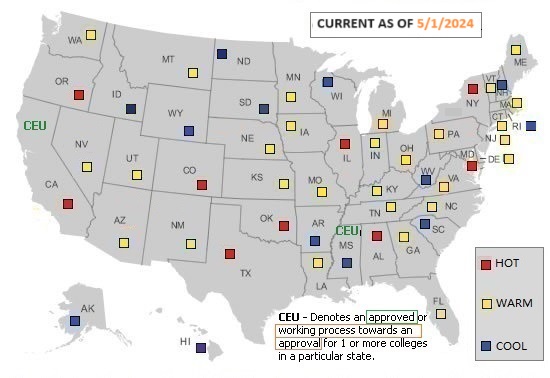"By providing a real-world education to collaborate with the learning obtained during their college years will assist in STEM learning outcomes and overall retention.With continuous improvement as the program focus we’ll strive to continue evaluating and improving the effectiveness."

| Career | Employers | Career | Employers | |
| Accounting | 129,667 | Human Development & Family Studies | 158,356 | |
| Art & Fine Arts | 48,850 | Journalism | 68,704 | |
| Biology | 38,232 | Kinesiology & Exercise Science | 121,909 | |
| Business Management | 814,648 | Labor Relations | 41,587 | |
| Chemistry | 44,251 | Marketing | 62,779 | |
| Communications & Media Studies | 166,345 | Mathematics | 223,968 | |
| Comparative Literature | 49,636 | Music | 28,627 | |
| Computer Science | 138,101 | Nursing | 91,452 | |
| Criminal Justice | 67,535 | Physics | 15,014 | |
| Dance | 20,894 | Political Science | 76,839 | |
| Drama, Theater & Visual Arts | 44,114 | Psychology | 51,735 | |
| Economics | 8,556 | Public Health | 10,769 | |
| Electrical Engineering | 130,236 | Public Policy | 82,302 | |
| English | 266,399 | Public Relations | 8,814 | |
| Health Science | 1,107,033 | Social Work | 370,697 | |
| Healthcare Management | 13,262 | Sports Management | 103,889 | |
| History | 232,905 | |||
Powered by |
||||
A: Experience imparts not just knowledge, but also understanding. Doing the work teaches real life use cases and best practices. While certifications provide a safety net and comfort to those hiring you, your skills and experience matter more in the long run.
A: Among technology employers, 47% say skills training credentials are most important when considering a candidate for an entry-level job. Only 26% say college degrees are impactful. Yet, the majority (81%) require degrees.
A: Employers want to know that a potential candidate will be a good fit for the role from the start. Certifications from credible institutions—especially those related to the skills required for a position—combined with experience help prove that a candidate is qualified for the job.
A: Those who participate in professional certificates and formal certification programs consistently report an increase in salary. Because a certificate demonstrates your commitment to specialized and enhanced training, many employers are apt to reward such behavior.
A: In the case you're taking a course or have not yet completed the necessary requirements to be licensed in a specific area, you can include these certifications, simply by adding 'in progress' to the description and stipulating the anticipated completion date.
A: Keep in mind that a combination of experience and certifications is always the best way to get the career you want. A degree alone is unlikely to get you in the door at any employer; you may also need at least one internship and preferably a lot of part-time experience.
A: Once they earn a certificate, students can earn higher salaries in more desirable jobs, giving them an edge over others. Surveys consistently show that these students are also able to gain more employment and career advancement opportunities.
A: Degrees typically provide individuals with a greater depth of knowledge than certificates. Certificate programs usually focus on teaching students specific and practical skills related to that career field.
A: Not only can taking an online course help you develop some of the basic skills you'll need for the new position, but listing it on your resume is a good way to show that you have the skills required for the job and include the keywords necessary to get past Applicant Tracking Systems (ATS).
A: Even in jobs where a certification isn't strictly required, it can be a good way to demonstrate your skills. The more well-known or established the accreditation is, the more true this is. If you're working or moving into a field with an industry standard certification, it might be well worth pursuing.
A: AWS Solutions Architect Professional
Google Cloud Platform (GCP) Certified Professional Cloud Architect
Certified Information Systems Security Professional (CISSP)
Certified Information Security Manager (CISM) by Information Systems Audit and Control Association (ISACA)
A: Definitely! You should only add certifications that add value to your resume. If you're a business analyst, for example, a Certification of Competency in Business Analysis (CCBA) WILL help get you hired. A bartending or CPR certification, though, won't.
A: Certifications when you are a student show that you have an interest and a skillset that is above the average highschooler. They show that you are a carrer-oriented person who is ready to get things done, which means colleges can have confidence you'll make their post graduation employment rates look good.
A: Learning new skills makes you marketable and relevant to employers. Certifications prove that you are both well-trained and committed to professional growth. They verify your skills and also your ambition. By enrolling in a course or training and getting certified, you'll gain valuable experience to add to your resume.
A: Diploma and certificate programs are sometimes available in the same subject, but diploma programs generally take a more in-depth look at a subject than a certificate program and may help prepare students for a particular career.